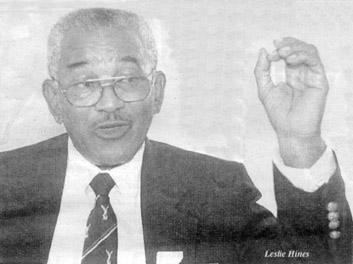|
||||||||||||||||||||||||||||||
| Home > Ex-Service > Article – Memories of War | ||||||||||||||||||||||||||||||
|
Reproduced with the kind
permission of the Jamaica Observer newspaper. Memories of War (cont’d) Leslie Hines For Leslie Hines it was pure fantasy. Like the present US Navy advertisement seen on cable television, Hines explained, the ones for the RAF in the 1940s boasted various, and similar, attractions. However, the actual experience was somewhat different from that. "When I first joined the RAF, it was just fantasy. I did it because of the attractive advertisements, which implied that I could join the RAF and see the world and maybe come back with a trade, etcetera…". But: "When you find yourself in it, and when the real situation confronts you, you realise that you have to settle with it." Hines’ father gave him the okay. His mother was not forthcoming with an opinion. "However, I knew she would have preferred that I did not go," he said. Hines was 20 then, legitimately of age, unlike many of his friends, who would later confess to having lied about their ages when the grimness of the real war situation hit them in England and they made an effort to return to Jamaica. "I got the initial training at Up Park Camp and Briggs Park. That was where the mode of discipline had to be adhered to and you had to either accept it or reject it. Well, if you rejected it, you would have to just leave. I thought my daddy was strict until I started the disciplinary training. Hines got his first taste of World War 11 during his voyage to England, when his ship came under enemy attack. "The vessel on which we were travelling across the Atlantic to England was fired upon on two occasions by the enemy in submarines. In one instance their charges were dropped, but we survived. I can’t tell you how, because at that point in time I did not know anything about it." The vessel travelled with others in convoy. The journey to England took 13 days. "The journey took so long because we stopped at Treasure Bay in New Orleans. Then from New Orleans to New York by train, and then we joined a convoy that would take us across the Atlantic to England – landing in Southampton." "On our voyage, I was put in charge of a deck. I was responsible for every member on that deck and whatever happened to them. There was a lot of seasickness so I had a lot of difficulty getting members together to be a part of the drills that they needed to partake in to enable them to escape from any sort of attack whether it be aerial or by sea."
"I had a tough time, and those who assisted me attested that they too had a pretty tough time, controlling those fellows…" "Well, the fact is that there were no reports of any casualties in the convoy itself although there were reports of attacks on vessels." He said that by the time the convoy got to England he already knew what to expect. Once there, the experience in the midst of the ‘battlefield’ was not sweet. "You would hear the sirens go off and when you looked there were a lot of enemy planes hovering above. "…But because of the warships – that is the convoy with high-powered weapons — they [enemy planes] could not come low to make an attack. So you would find that they would leave." These planes were spotted long before they came within firing range. "The sirens off, and you would take the necessary cover that you had been drilled into. That was the environment. Because enemy’s mission was to kill and rid of as many warships as possible do as much damage as they could, because the more they did that, [the more] it reduced the ability of Britain to defend itself. "The Germans felt that if they could destroy the RAF, they would hit Britain flat in no time. But they made a big mistake. We were not only strong, but, the two [types of plane] that we were using in our operation to defend ourselves were more maneuverable than theirs. The two planes were the Mustang and the Mosquito, being very fast and highly armed." |
|||||||||||||||||||||||||||||
|
|
||||||||||||||||||||||||||||||

 He continued, "…My problem was that seventy
per cent of the men on my deck had a lot of seasickness. It was terrible. And for those
who weren’t seasick, you would call and say, ‘Listen, help me to take this man to see
[the drill]’ but they were afraid to do it themselves as they were, afraid [of
getting] seasick themselves by watching other people’s dilemmas.
He continued, "…My problem was that seventy
per cent of the men on my deck had a lot of seasickness. It was terrible. And for those
who weren’t seasick, you would call and say, ‘Listen, help me to take this man to see
[the drill]’ but they were afraid to do it themselves as they were, afraid [of
getting] seasick themselves by watching other people’s dilemmas.